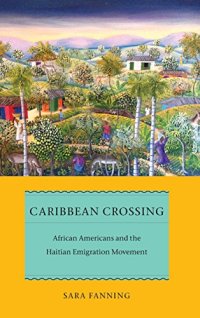
Ebook: Caribbean Crossing: African Americans and the Haitian Emigration Movement
Author: Sara Fanning
- Tags: African American Black Ethnic National Biographies Memoirs Africa Algeria Egypt Ethiopia Kenya Nigeria South Sudan Zimbabwe History Haiti Caribbean West Indies Americas United States Americans Civil War Colonial Period Immigrants Revolution Founding State Local Asia China Hong Kong India Japan Korea Pakistan Philippines Russia World Civilization Culture Expeditions Discoveries Jewish Religious Slavery Emancipation Women in Studies Specific Demographics Social Sciences Politics Discrimination Rac
- Series: Early American Places
- Year: 2015
- Publisher: NYU Press
- Language: English
- pdf
Shortly after winning its independence in 1804, Haiti’s leaders realized that if their nation was to survive, it needed to build strong diplomatic bonds with other nations. Haiti’s first leaders looked especially hard at the United States, which had a sizeable free black population that included vocal champions of black emigration and colonization. In the 1820s, President Jean-Pierre Boyer helped facilitate a migration of thousands of black Americans to Haiti with promises of ample land, rich commercial prospects, and most importantly, a black state. His ideas struck a chord with both blacks and whites in America. Journalists and black community leaders advertised emigration to Haiti as a way for African Americans to resist discrimination and show the world that the black race could be an equal on the world stage, while antislavery whites sought to support a nation founded by liberated slaves. Black and white businessmen were excited by trade potential, and racist whites viewed Haiti has a way to export the race problem that plagued America.
By the end of the decade, black Americans migration to Haiti began to ebb as emigrants realized that the Caribbean republic wasn’t the black Eden they’d anticipated. Caribbean Crossing documents the rise and fall of the campaign for black emigration to Haiti, drawing on a variety of archival sources to share the rich voices of the emigrants themselves. Using letters, diary accounts, travelers’ reports, newspaper articles, and American, British, and French consulate records, Sara Fanning profiles the emigrants and analyzes the diverse motivations that fueled this unique early moment in both American and Haitian history.
Download the book Caribbean Crossing: African Americans and the Haitian Emigration Movement for free or read online
Continue reading on any device:

Last viewed books
Related books
{related-news}
Comments (0)